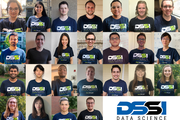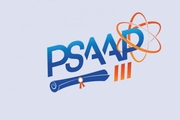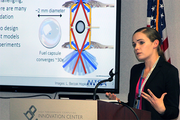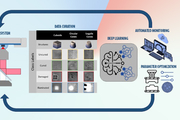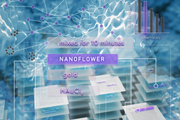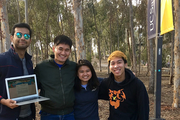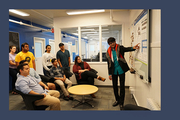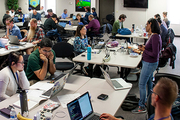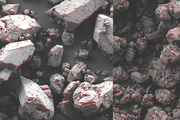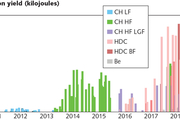Did you know we have a monthly newsletter? View past volumes and subscribe.
After successful virtual summer, DSSI looks ahead to 2021
Dec. 14, 2020 -
In a year distinguished by the COVID-19 pandemic, LLNL’s Data Science Summer Institute (DSSI) pivoted quickly to an all-virtual program. The 28 students in the class of 2020 worked from their homes and attended online seminars, one-on-one mentoring sessions, team-building games, and other activities. Instead of an in-person poster session, the students participated in a virtual Summer Slam...
DOE announces five new energy projects at LLNL
Nov. 13, 2020 -
The DOE today announced two rounds of awards for the High Performance Computing for Energy Innovation Program HPC4EI), including five projects at LLNL. HPC4EI connects industry with the computational resources and expertise of the DOE national laboratories to solve challenges in manufacturing, accelerate discovery and adoption of new materials and improve energy efficiency. The awards were...
From intern to mentor, Nisha Mulakken builds a career in bioinformatics
Nov. 3, 2020 -
The COVID-19 pandemic has sparked a wave of new research and development at the Lab, and Nisha Mulakken is very busy. The biostatistician has enhanced the Lawrence Livermore Microbial Detection Array (LLMDA) system with detection capability for all variants of SARS-CoV-2. The technology detects a broad range of organisms—viruses, bacteria, archaea, protozoa, and fungi—and has demonstrated...
LLNL to provide supercomputing resources to universities selected by NNSA Advanced Simulation and Computing program
Oct. 2, 2020 -
LLNL will provide significant computing resources to students and faculty from nine universities that were newly selected for participation in the National Nuclear Security Administration (NNSA)’s Predictive Science Academic Alliance Program (PSAAP). The program is funded by NNSA’s Office of Advanced Simulation and Computing (ASC) program. The primary focus of this third phrase of PSAAP will...
Machine learning speeds up and enhances physics calculations
Oct. 1, 2020 -
Interpreting data from NIF’s cutting-edge high energy density science experiments relies on physics calculations that are so complex they can challenge LLNL supercomputers, which stand among the best in the world. A collaboration between LLNL and French researchers found a novel way to incorporate machine learning and neural networks to significantly speed up inertial confinement fusion...
The internship that launched a machine-learning target revolution
Oct. 1, 2020 -
Kelli Humbird came to LLNL as a student intern and became a teacher of new data science techniques. In this profile, she describes her experiences and the path that led to her research inertial confinement fusion. Read more at the National Ignition Facility.
Machine learning model may perfect 3D nanoprinting
July 29, 2020 -
Two-photon lithography (TPL)—a widely used 3D nanoprinting technique that uses laser light to create 3D objects—has shown promise in research applications but has yet to achieve widespread industry acceptance due to limitations on large-scale part production and time-intensive setup. LLNL scientists and collaborators turned to machine learning to address two key barriers to industrialization...
Lockdown doesn’t hinder annual Data Science Challenge
June 26, 2020 -
Due to the COVID-19 pandemic and shelter-in-place restrictions, this year’s Data Science Challenge with the University of California, Merced was an all-virtual offering. The two-week challenge involved 21 UC Merced students who worked from their homes through video conferencing and chat programs to develop machine learning models capable of differentiating potentially explosive materials from...
Modeling neuronal cultures on 'brain-on-a-chip' devices
June 12, 2020 -
For the past several years, LLNL scientists and engineers have made significant progress in development of a three-dimensional “brain-on-a-chip” device capable of recording neural activity of human brain cell cultures grown outside the body. The team has developed a statistical model for analyzing the structures of neuronal networks that form among brain cells seeded on in vitro brain-on-a...
Carnegie Live: high energy density science and AI (VIDEO)
June 9, 2020 -
In this Carnegie Live video, Seiichi Shimasaki, Science Counselor for the Japanese embassy in the U.S., described a multiyear science research program (nicknamed the “Moonshot”) to develop new technologies that help solve some of society’s most pressing challenges. He explained that the Government of Japan was looking for a data science program to mentor young scientists, which led to the...
AI identifies change in microstructure in aging materials
May 26, 2020 -
LLNL scientists have taken a step forward in the design of future materials with improved performance by analyzing its microstructure using AI. The work recently appeared online in the journal Computational Materials Science. Read more at LLNL News.
Building knowledge and insights using machine learning of scientific articles
May 5, 2020 -
Nanomaterials are widely used at LLNL and in industry for many applications from catalysis to optics to additive manufacturing. The combination of nanomaterials’ shape, size, and composition can impart unique optical, electrical, mechanical, or catalytic properties needed for a specific application. However, synthesizing a specific nanomaterial and scaling up its production is often...
The incorporation of machine learning into scientific simulations at LLNL (VIDEO)
May 5, 2020 -
In this video from the Stanford HPC Conference, Katie Lewis presents "The Incorporation of Machine Learning into Scientific Simulations at Lawrence Livermore National Laboratory." Read more and watch the video at insideHPC.
New partnership results in increased access to compelling 'real world data'
April 21, 2020 -
Through a new partnership between the UC San Diego Library, Halıcıoğlu Data Science Institute (HDSI), and LLNL's Data Science Institute, UCSD library patrons can now access and analyze two new “real world” data sets from LLNL. The Open Data Initiative collection shares some of LLNL’s challenging and unique data sets, which range in complexity from large-scale, domain-specific simulated data...
Local Women in Data Science conference showcases Lab research
April 3, 2020 -
For the third consecutive year, LLNL hosted a Women in Data Science (WiDS) regional event on March 2. The event drew dozens of attendees from LLNL, Sandia National Laboratories, local universities, and Bay Area commercial companies.
Livermore was one of over 200 regional events in 60 countries coordinated with the main WiDS conference at Stanford University. According to the WiDS website...
‘Yes, you can’: UC Merced students learning, growing at Livermore Lab
Feb. 26, 2020 -
Just 90 miles UC Merced lies one of the epicenters of the future of technology, innovation and national security. The university and lab have teamed up to lay the groundwork for a direct pipeline between the two, opening a door to research collaborations as well as job and internship opportunities for students and alumni. Read more at UC Merced.
DSI sponsors LLNL hackathon
Feb. 18, 2020 -
Since 2012, Lawrence Livermore National Laboratory’s (LLNL’s) Computing directorate has held hackathons three times a year. These spring, summer, and fall events are scheduled over 24 hours and invite software teams to work on new ideas, programming languages, open-source tools, or project tasks. Exploration and experimentation are highly encouraged, and “It’s OK to fail” is the event mantra...
Machine learning accelerates high-performance materials development
Feb. 13, 2020 -
Lawrence Livermore National Laboratory (LLNL) and its partners rely on timely development and deployment of diverse materials to support a variety of national security missions. However, materials development and deployment can take many years from initial discovery of a new material to deployment at scale. Now, an interdisciplinary team of LLNL researchers from the Physical and Life Sciences...
Deep learning may provide solution for efficient charging, driving of autonomous electric vehicles
Feb. 4, 2020 -
LLNL computer scientists and software engineers have developed a deep learning-based strategy to maximize electric vehicle (EV) ride-sharing services while reducing carbon emissions and the impact to the electrical grid, emphasizing autonomous EVs capable of offering 24-hour service. Read more at LLNL News.
Can machine learning improve computer models enough to ignite internal confinement fusion?
Jan. 28, 2020 -
Laser-fusion researchers have turned to machine-learning techniques to seek the combinations of laser pulse characteristics and target design needed to optimize target implosions for inertial confinement fusion. Machine learning has tripled the fusion yield of the simpler direct-drive approach being studied with the OMEGA laser at the University of Rochester. In principle, the Rochester...

